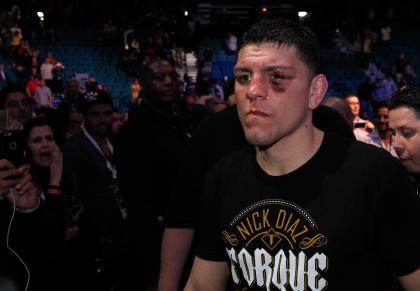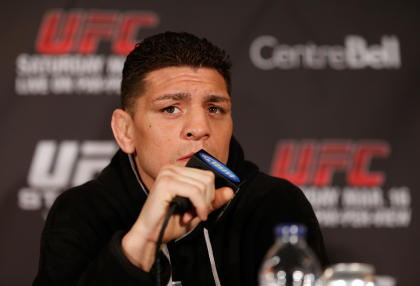Cruel and unusual: Nevada commission's five-year ban on Nick Diaz is abuse of authority
Anderson Silva, a revered figure in mixed martial arts and one of the sport’s greatest competitors, made a mockery of his disciplinary hearing in front of the Nevada Athletic Commission last month in Las Vegas in which he appeared to answer doping allegations made against him.
It was a laugh-a-minute session as Silva concocted a story about a friend from Thailand who gave him an unidentified substance in an unmarked blue vial that he used to aid him in sexual performance.
Wouldn’t you know it, that substance his friend gave him happened not to be Cialis or Viagra and instead turned out to be an anabolic steroid.
On top of taking the steroid, Silva admitted to taking two other banned substances.

For that, Silva was given a one-year suspension and fined $380,000. The fine represented 30 percent of Silva’s fight purse and 100 percent of his win bonus. He’ll be eligible to fight on Feb. 1, 2016.
Silva got off way easy when compared to the shockingly harsh penalty handed to Nick Diaz, his opponent at the ill-fated UFC 183 on Jan. 31 in which both men failed their drug tests.
The 32-year-old Diaz on Monday was given a five-year suspension and fined $165,000, or 33 percent of his $500,000 purse, for testing positive for marijuana.
It was the third time Diaz has had a positive test in Nevada, and he also ran from a drug test prior to a scheduled fight in California in 2009 which clearly weighed heavily on the four commissioners who decided his case.
Diaz attorney Lucas Middlebrook did a wonderful job chipping away at the commission’s case, but it got Diaz nothing but a huge legal bill.
He was tested three times on Jan. 31, twice by the World Anti-Doping Agency-accredited Sports Medicine Research and Testing Laboratory (SMRTL) in Salt Lake City and once by Quest Diagnostics.
Quest isn’t accredited by WADA.
[ThePostGame: Ronda Rousey reveals surprising pre-fight ritual]
Nevada recently raised the limit for a positive test for marijuana to 150 ng/ml. Diaz gave samples to SMRTL at 7:12 p.m., just before his fight with Silva, which came back at 48.73 ng/ml and at 11:50 p.m., about two hours after it. That came back at 61.04 ng/ml, meaning both were negative.
However, he gave a sample to Quest at 10:38 p.m., that came back at 733.23 ng/ml.
Diaz, who was suspended in 2007 and in 2012 by Nevada for marijuana use, didn’t request the B samples from any of the three tests to be examined, as was his right when he learned the A sample was positive.
Dr. Hani Khella, a medical review officer and the CEO of Industrial Medical Testing, appeared as a defense witness and testified the reason he didn’t recommend the B samples be tested was that Diaz already had two negative results from SMRTL.
Middlebrook was masterful building a case that the positive sample from the Quest test should be ignored.
The commission, though, chose to overlook it. Chairman Francisco Aguilar said during deliberations that he believed other circumstances should play a role in the penalty handed down. Commissioner Pat Lundvall originally proposed a lifetime ban, but cut it to five years when commissioner Anthony Marnell expressed skepticism.
It’s clearly ludicrous to suspend one guy for a year for using a performance-enhancing drug and another guy five years for smoking marijuana. And that’s if you agree about the validity of the test result from Quest, which Middlebrook managed to make look extremely suspect.

If this had been a jury trial instead of an administrative hearing, there’s a good chance Diaz would have walked with no penalty.
Dr. Barry Sample, the director of science and technology at Quest Diagnostics, testified by telephone because the commission does not have the budget to fly him in and house him for such proceedings.
Sample may have been able to explain the vast differences between the Quest results and the SMRTL results had he been there in person, but he was not and thus did not.
The burden is on the commission to prove its case and it woefully failed to meet it on this day.
Meting out punishment is a solemn obligation, particularly in a matter that may end a person’s career, and it shouldn’t be taken lightly.
If you’re going to give Diaz a five-year penalty for using marijuana, which is legal in several states, then the commission absolutely had to have far better evidence of guilt than it presented.
Let’s assume Aguilar was correct in his comments during deliberation that other factors played a role. Assume that Diaz made it difficult for the commission to license him prior to the Silva fight, not showing up until two days before the bout.
But it’s the commission with the power here. They had the ability to order him to appear far earlier than he did.
Its insinuation, of course, is that Diaz knew he couldn’t provide a clean drug test any earlier, as he was required to do to be licensed, because he was using marijuana. Perhaps that’s true.
But why did the commission allow him to play the system? It knew about six months earlier that Diaz would be fighting Silva on that weekend. It knew that because of his suspensions for the same offense in 2007 and 2012, it would need Diaz to provide a clean test before he was licensed.
The commission had the ability to write Diaz a letter at any point telling him that he had to be drug tested by a specific date and that he had to appear in front of it by a specific date or he would not be licensed.
The commission chose not to do that and let Diaz pick his own date when he’d appeared. If he’s allowed to show up when he wants, why wouldn’t he pick the date that was most convenient for him?
This simply feels like a vast overreach and an abuse of authority.

The Nevada Athletic Commission, led by Aguilar, should be commended for its dedication to removing performance-enhancing drugs from the sport. Marijuana isn’t a performance-enhancing drug, but as long as it’s on the WADA banned list during competition, it’s within the commission's rights to test for it and to penalize for failed tests.
However, the testing must be accurate and the penalties must be proportional.
Silva committed a far more egregious offense and made a complete joke of his hearing, and got a one-year penalty.
Diaz hired an excellent attorney who presented a compelling case. Yet, he received what could amount to a lifetime ban for reasons that never quite became clear.
Never did the Nevada Athletic Commission seem more like a kangaroo court than it did on Monday.
Hopefully, a judge will step in and right this outrageous injustice.
